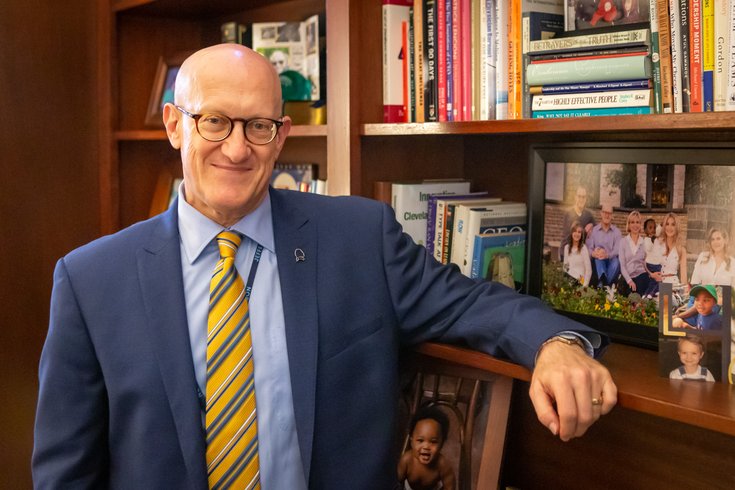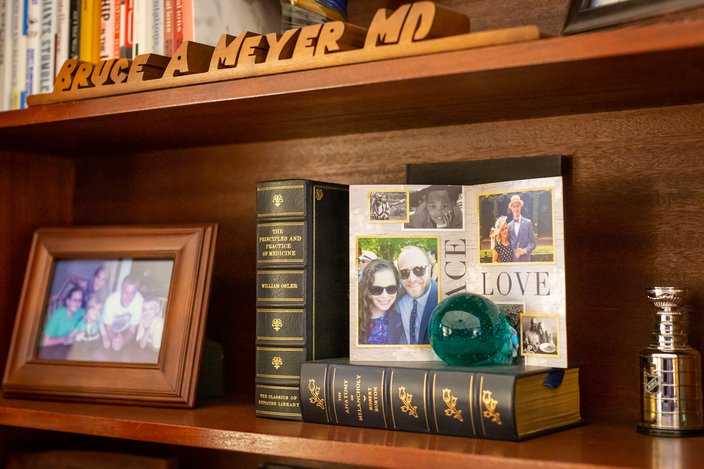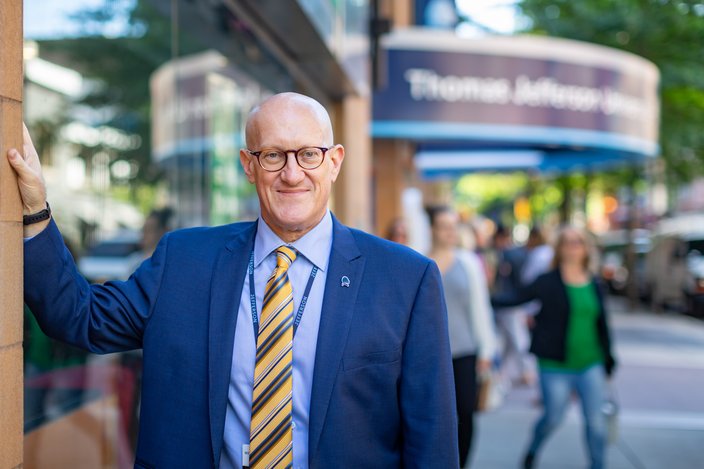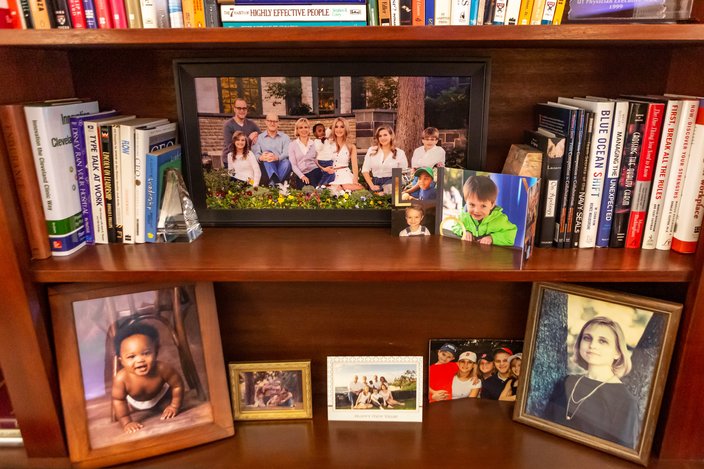
June 13, 2019
 Thom Carroll/PhillyVoice
Thom Carroll/PhillyVoice
Dr. Bruce Meyer, the clinical leader at Jefferson Health, is tasked with integrating physicians into one of the most rapidly expanding health systems in the United States.
To hear Dr. Bruce Meyer tell it, the anxiety he felt when his wife, Christie Jo Little, was diagnosed with cancer in 2000 hit him hard – and in a flash.
At the time, the five-year survival rate for fibrosarcoma stood around 50 percent. The couple had five children, all age 11 or younger. The possibility of being a single dad of a large family looked very real.
"In my head I'm going, 'Oh my god,'" Meyer said. "Nobody is talking to me about that. How do I manage that while I'm trying to manage my wife's emotional response – because she's the person who has this disease."
Both obstetricians by trade, both Meyer and Little had the medical knowledge to understand her situation better than most people. Researching similar cases deepened Bruce's understanding of the path they faced, assuaging some of his anxiety.
Nineteen years later, Christie remains cancer-free.
Still, the experience gave Meyer a new perspective on health care. He saw glaring deficiencies in the way many physicians counseled their patients. Too often, they focused strictly on the medical issue at hand, leaving patients – and their families – unprepared for related challenges.
That realization changed the way Meyer practiced as a clinician. And it's one of many transformative experiences that shapes the way he fulfills his current role as president of Jefferson Health and senior executive vice president of Thomas Jefferson University.
"There was a point in my life where I realized that, as a clinician, I can impact so many lives, but I can only impact so many lives that I can see in front of me every day," the 62-year-old Meyer said. "If I could create an environment in which (medical providers) could do better work, then I could touch a lot more patients and I could make a much bigger difference in the lives of those people."
Meyer arrived at Jefferson in September 2017 after spending a decade at the University of Texas Southwestern Medical Center in Dallas. In Jefferson, Meyer saw a unique opportunity to mold one of the fastest-growing health systems in the United States at a time when the industry is searching for more sustainable economic models.
Since 2013, Jefferson Health has evolved from a three-hospital, academic medical center based in Philadelphia to a multi-state network of 14 hospitals – with new additions pending. Plus, the system's academic hub, Thomas Jefferson University, merged with Philadelphia University, an unconventional marriage that could pave the way for similar conglomerations elsewhere.
This all has come under the watch of Chief Executive Officer Stephen K. Klasko, a charismatic visionary who has drawn considerable media attention for his innovative approach to health care reform. But his more anonymous underlings, like Meyer, have their own unique stories – and plenty of transformative ideas, too.
Dr. Bruce Meyer has almost two dozen family photos, including this holiday card, on the shelves in his office at Jefferson Health.
"Bruce is a rare physician-leader who understands operations at every level and is willing to use that knowledge to transform healthcare to a value model," Klasko wrote in an email. "I think it is incredibly important that physician leaders are 'doctors' first. Bruce had a very successful high-risk obstetrics career before entering a leadership role."
Meyer, who lives in the Villanova section of the Main Line, delivered more than 12,000 babies over an obstetrics career that began in the late 1980s. As a multiple gestation subspecialist, he has delivered septuplets, two sets of sextuplets and five sets of quintuplets. Not to mention numerous sets of quadruplets, triplets and twins.
"For me, being at that transformational moment when a baby is delivered and that family is utterly transformed, that's amazing," Meyer said. "That's proof of God. That's the miracle. I love that and it never gets old."
Meyer has done so while raising seven children with his wife, including two adopted kids. They tend to four dogs. Somehow, he has found time to train as a Shakespearean actor.
Yet, his desire to fix stuff – particularly processes – led him to pursue an MBA and, eventually, several administrative roles while simultaneously running obstetrics clinics.
"We're a health care team that cares about a person who has a disease and not just a disease itself." – Dr. Bruce Meyer, president of Jefferson Health
Along the way, Meyer authored more than 70 peer-reviewed publications, including research examining the benefits of optimism on high-risk pregnancies. (An expectant mother's optimism can impact birth weight, gestation length and the number of days a newborn spends in the hospital.)
Among the most predictive factors of patient optimism? A woman's impression that her medical providers believe a good outcome is possible.
Such benefits extend to other areas of medicine as well, Meyer said. But providers must be careful not to provide unrealistic expectations – and optimism doesn't work in every situation. For instance, research shows it has no impact on glioblastoma, a brain cancer with extremely low survival rates.
"We understand you have to give people risk and benefits, because that's what we do," Meyers said. "But if in doing so you present a pessimistic viewpoint of the likelihood of a good outcome, you actually worsen the chances of a good outcome for that patient. So then how do we use phraseology and body language and tonality to improve that in a way that we present to patients?"
At Jefferson, Meyer has hosted educational opportunities for fellows, residents and faculty, stressing the benefits of optimism. But he also found a culture ready to embrace such insights.
"We're a health care team that cares about a person who has a disease and not just a disease itself," Meyer said. "It's very much embedded deeply in the culture that we want to care about the person and how the disease affects their lives. And, how do we help that?"
That importance of helping patients adapt to lifestyle changes first became clear to Meyer during his wife's cancer battle.
Dr. Bruce Meyer delivered more than 12,000 babies in his career, including several sets of septuplets, sextuplets and quintuplets. He says his experience as an obstetrician shapes the way he fulfills his role as a Jefferson Health executive.
The clinician who handled Christie Little's fibrosarcoma diagnosis did something residents are told never to do.
He informed her about a pathology report on a late Friday afternoon, though he was unavailable to discuss treatment options until the following Monday. She had all weekend to stress without having all the facts at hand.
The experience spurred Bruce to search for ways to reduce the added anxiety faced by patients and their families.
"We do stuff that produces enormous anxiety in folks every day that we don't think about," Meyer said. "If I order a CT scan for you because you have a headache, the first thing you're thinking is, 'Oh my god, what could that CT scan show?' The longer it takes for you to get an answer ... the higher the anxiety level is."
Perhaps more profoundly, Meyer realized that most doctors do not adequately prepare patients for the way treatments will impact their lives. Nor do they focus on the ways an illness or condition affects the patient's family.
"You're going to have an emotional response to this and how you manage your own emotional response while managing your loved one's emotional response is actually important," Meyer said. "I don't have a magical way to tell you how to do that, but at least the recognition that it's real is valuable."
In treating Christie's cancer, doctors removed a finger from her dominant hand, a portion of her palm as well as tendons extending to her elbow. She received a prosthetic finger, but doctors failed to prepare her for basic life changes.
Nerve damage limits her ability to change a light bulb, hold change and wash dishes, among other lifestyle changes. It also ended her career as a surgeon.
"We do a really good job of explaining why the treatment is a good thing to do and what the risk and benefits of the treatment are," Meyer said. "We do a terrible (job) of explaining, well, how are you going to live your life?"
With that in mind, Meyer began counseling his obstetrics patients differently, particularly those expecting multiple children. He began discussing the lifestyle changes that would follow, including the sheer number of daily diaper changes – as many as 50 for quadruplets – and how to prepare dozens of bottles on a nightly basis.
Those day-to-day changes place heavy burdens on families, Meyer said. And it shows.
His research found couples who have triplets or more divorce at higher rates than other parents.
"If you start with a large number of kids all at once, just figuring how you manage your life becomes very difficult," Meyer said. "I started counseling people on ... the effect on the totality of your life and not spending all my time talking about, this week, you'll feel kicking this way and etc. I think it made me a better clinician."
As Jefferson' Health's clinical leader, Dr. Bruce Meyer is responsible for integrating five mergers into a system that maintains the consistent, enterprise-wide standards needed to ensure patients receive reliable, quality and safe care at any Jefferson location.
For the first time in his career, Meyer's role no longer includes an obstetrics clinic.
He's mostly focused on his administrative duties as Jefferson's clinical leader. Among the biggest: Integrating five mergers into a single health system while maintaining the consistent, enterprise-wide standards needed to ensure patients receive reliable, high-quality and safe care at any Jefferson location.
It's a task Klasko labeled "Herculean," one that requires strategic decisions that impact the direction of the health system.
As chief operating officer, Stephanie Conners said she has watched Meyer confront those challenges by thinking boldly and differently, but without compromising his core value of ensuring optimal patient care.
"When he's faced with those decisions, he really focuses on merging the cultures and allowing those who are the experts to be part of the decision and prioritizing the core of our patients," Conners said. "He really takes into consideration the voices of others as these cultures merge together to provide optimal care."
That's no surprise to Dr. Thomas Royer, a mentor who once sat across the negotiating table from Meyer when the latter was at UT Southwestern. Royer, then the interim CEO of Parkland Health in Dallas, said he quickly recognized Meyer was "a winner."
Meyer has the makeup of a successful physician leader without the arrogance that too often accompanies them, Royer said. At the negotiating table, Meyer was well-prepared but also an excellent listener willing to rethink his perspective.
"It's a ministry. It's more than work, it's a calling. It's a great way to be helping people." – Dr. Thomas Royer, emeritus CEO, Christus Health
"He has humility," Royer said. "He doesn't say, 'This is what I know.' It's 'What can I add to the team?'"
From his administrative seat, Meyer said he sees a shifting paradigm in health care. It's an exciting, but challenging one, he said.
"More and more stuff is ambulatory and not inpatient," Meyer said. "We're much less focused on hospitals and far more focused on ambulatory settings, on home care, on how we provide a high quality of life and not just a high quantity of life."
Jefferson now has more than 40 outpatient and urgent care centers throughout the region. Each year, the health system handles more than 4.4 million outpatient encounters.
The most successful health systems will provide community value by improving medical outcomes, safety and patient access – all while reducing costs, said Royer, the emeritus CEO of Christus Health in Irving, Texas.
That process sometimes creates unrest among physicians frustrated by increased regulations and documentation, Royer said. But leaders like Meyer bring clarity to the path forward by explaining their rationale and including physicians in the process.
"I think he understands it's more than a business," Royer said. "It's a ministry. It is more than work, it's a calling. It's a great way to be helping people. I think the same thing drives him in his personal relationships with his wife and his family."
A large photo of Dr. Bruce Meyer's family and a holiday card with his most-recently adopted son, Luke, sit prominently on a shelf in the executive's office at Jefferson Health.
Meyer has a demanding job. It requires long hours and often necessitates that he take work home. But he also maintains a busy family life.
The Meyer household bustles with activity and noise, Meyer said. With seven children ranging in age from 2 to 31, how could it not?
Yet, that's the way he and Christie like it.
"What we learned is that quality time comes out of quantity time," Meyer said. "You can't program it. ... It happens when it happens, so you just have to provide opportunity. So, we hang out a lot together as a family."
As a rule, the family always eats dinner together. And on weekends, Meyer said he gets up around 5 a.m., exercises, and then spends several hours completing whatever work he's brought home. His goal: Complete the work by the time his children rise.
Amazingly, Meyer said, he and Christie have only missed three pick-ups of their kids from school and other activities in three decades as parents.
"Even if you have a big, extended family, the reality is you just do the best you can and work your way through every challenge," Meyer said. "We've been very blessed with kids who were bright and were self-motivated."
But Meyer insists he and Christie are not remarkable. They're just pursuing the lifestyle they set out to live.
"If we're exceptional in any way it's because we really wanted to have a big family," Meyer said. "And we've done that with intentionality."
After having five children on their own, pregnancy complications prevented them from having expanding their family biologically.
They initially turned to adoption agencies, but had several possibilities fall through, both internationally and domestically. Then, they learned of a boy in the foster care system who had been born with spina bifida.
It opened their eyes to another world.
"There's 500,000 kids in the foster care system in the United States, all of whom are looking for adoption at this point," Meyer said. "We really uncovered something that we really had no idea existed and, shame on us that we were ignorant of that, but we were."
The Meyers adopted the boy and for several years afterward also served as foster parents in Dallas. Last December, they formalized the adoption of their seventh child, another foster kid.
They can expect the noise and activity to continue for good while longer. Just the way they like it.
Follow John & PhillyVoice on Twitter: @WriterJohnKopp | @thePhillyVoice
Like us on Facebook: PhillyVoice
Add John's RSS feed to your feed reader
Have a news tip? Let us know.
 Thom Carroll/PhillyVoice
Thom Carroll/PhillyVoice Thom Carroll/PhillyVoice
Thom Carroll/PhillyVoice Thom Carroll/PhillyVoice
Thom Carroll/PhillyVoice Thom Carroll/PhillyVoice
Thom Carroll/PhillyVoice